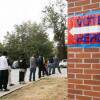The state Senate will debate a major reform package tomorrow that aims to modernize voting in Massachusetts and codify many of the changes to voting we've seen come out of the pandemic. GBH News’ State House reporter Mike Deehan joined GBH’s All Things Considered to discuss the legislation’s future with Arun Rath. What follows is a lightly edited transcript.
Arun Rath: So tell us, what are the items that are up for debate tomorrow?
Mike Deehan: The Senate is setting out to do kind of this massive reform of voting. Most of it is to codify some of the things that were put in place on an emergency basis when the pandemic struck — and really voting had to be upended for the 2020 election and kind of subsequent municipal elections we've seen.
So what this would do, it would permanently allow for early voting with set hours. That's something the state had been doing more and more recently. It became a big success, especially last year, when people — [it] was much easier to go in early when there was less of a crowd in order to cast their ballot.
It would also make a permanent early voting-by-mail for everyone. That's kind of the main pitch here. What we had last year, where you can request a ballot, get it back and send it in or drop it off at one of the municipal drop boxes. That system would be made permanent and kind of standardized across the state.
You would also be able to request that early ballot from the Secretary of State's website, so that would be something a little bit new. Instead of getting that mailed to you the way it has been — there would be a notice mailed to you, but also you could directly request one from the Secretary of State. And like I said, the Secretary of State would mail out an application for a ballot every other year. So basically, when it's an even-numbered year with a big state or federal election in November, you would get an application in the mail for the primary and then for the November general election.
Rath: So this range of practices that worked well in the pandemic, they're talking about making these permanent. Is there anything new in this package?
Deehan: Yeah. The biggest thing that Senate President Karen Spilka and the Senate want to introduce is that it would basically create same-day voter registration, which is something that voting reform advocates have been fighting for for years and years. It would essentially allow you to come in during the day of the election, register to vote that day — if you fit the criteria for regular registration. It would require a written oath of eligibility and proof of residency. If you don't have that, you'd have to fill out what's called a provincial ballot that would be sorted out after the fact when staff had time to look at your credentials, things like that. And it would require more registration sessions in the run up to Election Day so that you would be able to register, really, any time before that.
Right now, we have a system where it's about 20 days, give or take, where it gets cut off — registration cuts off before Election Day, and if you miss that deadline, you can't get into it and then go vote. And that's something that's been a frustration for a lot of folks for a long time because, as we know, that's when people get the most excited and interested in an election. So if you are waiting until the last two weeks to really learn about candidates and get into election, you could find that you are no longer eligible to vote.
Rath: The debate over voting laws, people who are critical of this sort of expansion would be saying, “Well, it could make elections less secure.” Is election security taken on in any of this?
Deehan: A little bit. Several new protections are in the bill, and it standardizes a lot of the procedures for making sure that ballots are secure — so a lot of language in there about what polling place workers can and can't do, what local election officials can and can't do, what they should and shouldn't do for maintaining the security of these ballots. So how they are counted and how are they collected is definitely on the minds of the Senators.
And it also allows the attorney general and the district attorneys, they would actually be required to investigate credible allegations of illegal registration or multiple voting, because if you can register on the same day, there's a worry that people might try to go to different polling locations and then vote more than once. That's something they've taken into account, and they would empower prosecutors to go after folks when there are credible allegations.
Rath: You know, it seems like these debates in the Legislature don't often seem to lead to significant changes from what Democratic leaders already want to pass. But are there any changes that some Senators might want to make to this bill?
Deehan: Yeah. Like you said, usually when the Senate President says, “This is the bill,” that's what gets passed, and their hours of debate don't usually lead to too many changes.
But a lot of the debate that we're going to see tomorrow is around how prisoners and inmates vote, and how they are registered. So the bill, as is: it requires jails and corrections officers to post information on posters about the upcoming elections and about people's eligibility. I think a lot of folks don't really even know that most people who are incarcerated or held in Massachusetts are eligible to vote. It's only people who are serving felony sentences who do not have the franchise.
So there is an amendment that's going to be debated tomorrow from Pittsfield Senator Adam Hinds. He wants to push it even further from what Spilka already has in the bill, as is. His amendment would really push sheriffs and corrections officers to hand out and collect ballots, offer registration forms to everyone — practically — that comes through the system, make them agents of registration, really put the burden on the sheriffs and the wardens and the corrections officers and D.O.C. to really make that change, and make it a part of what it means to be incarcerated.
So supporters think that they can wiggle some room in here and get the Senate to back this, pushing it a little bit forward so that people who are behind bars can have really a lot more practical access to the ballot.
Rath: When this goes to Governor Baker — I know that there's one thing in here, same-day voter registration is something that he is not in favor of. Do you think he might demand some changes, or do you think there's a chance even of a veto?
Deehan: He very well may. He's been pretty consistent not supporting that same-day registration element of this, which is the biggest part of what Spilka wants to put in play here.
This bill would still need to pass the House. We spoke with House Speaker Ron Mariano this week, and he just basically said, “Let's see what the Senate sends over.” He wasn't really showing his cards on what the House intends to do. There is interest on the House side to do something, but it's really unclear whether or not they want to go as far as Spilka and the Senate do on getting the same-day registration in law.
So that could be something that gets negotiated — with that specter of Baker's veto over there, it could be a tight vote. So if the House does go along with the same-day voter registration, we'll have to see if they have a veto-proof margin to kind of override Baker's objection, if it comes to that.
Rath: Very interesting. We'll be watching this for a while, Mike. Thank you.
Deehan: Great to be with you.









